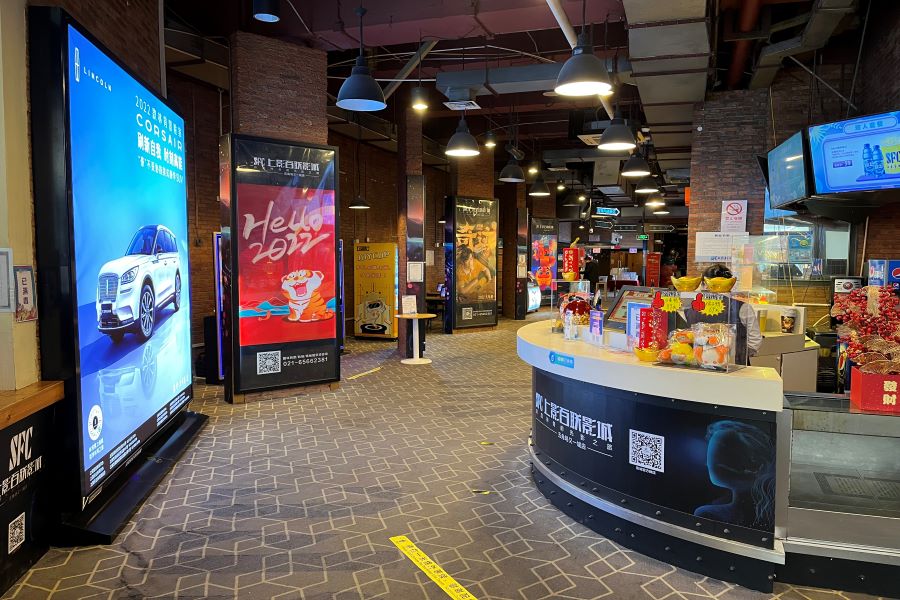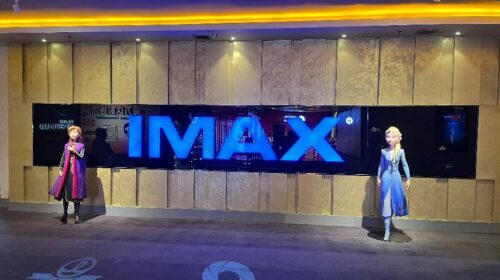It’s ‘Lights, Camera and Some Action’ for Imax China After Strong Holiday Box Office

Nationwide ticket sales reached $943 million over seven-day Lunar New Year holiday, down 21% from last year but ahead of pre-pandemic levels in 2019
Key Takeaways:
- China’s Lunar New Year box office totaled 6 billion yuan over the Lunar New Year holiday, up slightly from pre-pandemic levels despite recent Covid flareups
- New data shows theater operator Imax China’s profit doubled in the second half of 2021, though it has yet to comment on omicron-related disruptions in December and January
By Doug Young
China’s consumer-facing sectors have become a land of mixed messages these days, performing well for a few months, only to suddenly become paralyzed with a new Covid flareup.
The movie industry is one of the most vulnerable in that regard, since cinema operators have no substitute for business when they’re forced to close, unlike restaurants and shops that can still sell in more limited quantities through online and takeout channels. Despite that, the latest signals coming from cinema operator Imax China Holding Inc. (1970.HK) and broader industry data from the long Lunar New Year holiday look relatively upbeat.
Imax, which operates 759 theaters in China, announced on Monday that it returned to the black last year, saying it expected to post a profit of $37.5 million to $39 million in 2021 versus a loss of $27 million a year earlier. After subtracting the company’s previously announced first-half results, its profit for the second half of the year should be about $19 million, more than double the year-ago profit of $8.2 million.
The fact Imax China was profitable at all last year is probably a major accomplishment in itself, since most other cinema operators both in China and around the world are currently losing money. Investors seemed undecided on the matter, bidding Imax China’s stock down by 2.2% on Monday after the initial announcement, only to bid it up by a similar amount early Tuesday.
The improving sentiment on Tuesday may have been at least partly due to new data that showed the China box office performed relatively well over the weeklong Lunar New Year holiday that occurred this year from Jan. 31 to Feb. 6. Ticket sales during the seven-day period totaled 6 billion yuan ($943 million). That figure was actually down 21% from the strong 7.8 billion yuan a year earlier when Chinese were returning to theaters in large numbers after a difficult time during the first year of the pandemic. But it was a slight improvement over the last pre-pandemic Lunar New Year box office of 5.9 billion yuan in 2019.
The reality was that this year’s Lunar New Year box office could have been much worse due to the on-again-off-again nature of China’s Covid restrictions. Those restrictions began to ramp up in December with the worldwide surge in the omicron variant, which led to several outbreaks in China and saw the entire city of Xi’an locked down that month.
As other outbreaks occurred, the other major cities of Tianjin and Zhengzhou were locked down to some extent in January. When such lockdowns occur, theaters are mostly forced to shut and thus their revenue is suddenly reduced to zero. Hotels in affected areas are also major victims, which was evident in preliminary fourth-quarter results given in late January by Huazhu (HTHT.US; 1179.HK), one of China’s leading operators.
What’s the Sequel?
If December and January marked the latest low point for theater operators and other major consumer-facing sectors, the big question many are now asking is: Where do things go from here? It’s still early, but the latest box office figures appear to show that things should start improving from this month and the trend could continue through the spring as Covid fades with the end of this year’s cold and flu season.
Another major factor is the Winter Olympics happening now in Beijing. China became extremely cautious in the run-up to the event, which is probably at least partly why so many major lockdowns occurred in December and January. With the event set to end Feb. 20, the country may start to relax a bit and return to its older system that relied on just massive testing and only very limited neighborhood lockdowns when cases occur, which are far less disruptive to businesses.
China’s own fourth-quarter earnings season won’t begin for another week or two, so nobody has spoken about the current situation yet. Fast food giant McDonald’s (MCD.US), which has about 4,000 stores in China, said in late January that its same-store sales in the market fell in the fourth quarter, but didn’t comment on the situation in January. Starbucks (SBUX.US) was similar, saying same-store sales for its network of more than 5,000 China outlets dropped 14% in the final three months of last year.
Imax China’s stock reflects the uncertainty that many investors feel about the situation. Since hitting a 52-week low of about HK$10 last August, the shares have been relatively stable in the HK$10 to HK$13 range, rising during periods of optimism, only to fall when setbacks occur.
The stock is valued relatively strongly compared to other theater operators, probably because it’s one of the few in its class to be profitable in the current environment. It’s price-to-earnings (P/E) ratio looks relatively solid at 13, based on the last profit forecast. On a price-to-book (P/B) ratio the company commands a ratio of 2, lower than the 3 for its parent Imax Corp. (IMAX.US), but well ahead of the lowly 0.18 for AMC Entertainment (AMC.US), one of the leading U.S. cinema operators.
Imax China is relatively weak compared with Chinese film production companies, reflecting the fact that the latter group derive a growing amount of their revenue from online movies and TV series that are relatively unaffected by pandemic-related disruptions. Alibaba Pictures (1060.HK) and Beijing Enlight Media (300251.SZ) trade at price-to-sales (P/S) ratios of 5.8 and 17, respectively, both ahead of Imax China’s P/S of 5.
At the end of the day, the relatively strong Lunar New Year box office, combined with the upcoming end of the Beijing Winter Olympics and end of cold and flu season all seem to bode well for Imax China and other Chinese cinema operators and retailers in general. That could point to some upside for the sector if the country can go for several consecutive months without any major new business disruptions, which seems quite possible based on the latest trends.
To subscribe to Bamboo Works free weekly newsletter, click here






